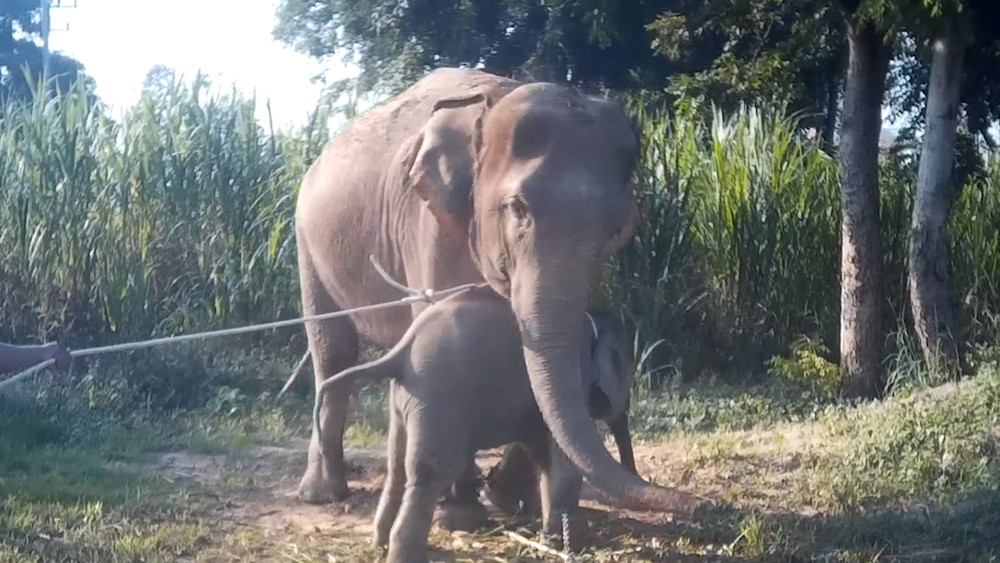
Photos courtesy of World Animal Protection.
Today, the World Animal Protection uncovers shocking new footage of the cruel training process, known as “the crush”, that baby elephants endure to make them submissive enough to interact with tourists. The new video – the first of its kind in over 15 years – shows baby elephants wailing as they are forcibly separated from their mothers, tied still with ropes, and jabbed with spiked bullhooks.
The global, nonprofit organization is calling for a complete overhaul of the way captive elephants are treated in Thailand and other vacation destinations once tourism resumes after the world-wide collapse due to the COVID-19 pandemic. World Animal Protection’s ultimate goal is to end the wildlife trade in all its forms.
“We want to expose the extent of the true suffering these animals endure – a lifetime of horror for that ‘once in a lifetime’ holiday experience.” Audrey Mealia, Global Head of Wildlife at World Animal Protection states. “The tourism industry has come to a halt in the wake of COVID-19 but it will re-build – this is the ideal opportunity to build a better future. We are calling on the tourism industry to revise their wildlife policies and stop offering exploitative experiences to their customers. Right now, elephants are not being used for riding, bathing or shows. We’d like to keep it this way. Although we need to enable a more humane alternative for these elephants to be cared for better.”
The disturbing footage of eight baby elephants was captured between December 2018 and January 2020 to document common techniques used to break elephants’ spirits and make them submissive enough to be used for performing, riding, bathing, and other tourist interactions, which is often done using a range of techniques. These include:
- forceable separation from their mothers which would not happen in the wild
- the use of a bullhook – a metal tool used to jab sensitive areas often resulting in open wounds
- chains to restrain them in an uncomfortable narrow standing area – the crush – for days on end
- frequent exposure to stressful situations such as walking along traffic-heavy roads
Previous elephant training footage has only involved single incidents, which were rejected by the elephant tourism industry as procedures that were no longer common. World Animal Protection’s new investigation is the first time that so much high-quality footage has been documented, revealing the most common practices used to train young elephants for use in tourism by some of the best-known trainer teams in Thailand. There are approximately 2,800 captive elephants exploited in camps across Thailand, who have undergone this cruel training.
As a sustainable, long-term solution, World Animal Protection is advocating for a breeding ban on captive elephants to ensure future generations are spared this trauma. Vacationers also hold considerable power to turn their backs on unethical practices and can opt instead to see elephants in their natural habitat or support elephant-friendly camps.
For most captive elephants, being released back into the wild is not possible, so an elephant-friendly camp is their best option. These camps work on an observation-only model, still providing jobs and a valuable income to local people such as elephant keepers, known as “mahouts.”
“We are at a turning point when it comes to our relationship with wild animals. For too long, these intelligent, sociable, creatures have been the victims of a cruel trade that rips baby elephants from their mothers and family groups. In the wild, mother, daughter and granddaughter elephants spend their entire lives together”, explains Audrey Mealia, Global Head of Wildlife at World Animal Protection.
“Instead they are destined for a life of suffering and brutality behind the scenes, cruelly exploited as entertainers under the guise of innocent fun for visitors. Tourists are duped into believing they are helping these elephants and the conservation of the species, while in reality, they are creating the demand for such activities“.
World Animal Protection is calling on tourism companies, tourist operators, and individual travelers to take responsibility and put an end to the exploitation of wild animals forever – less demand will mean less elephant suffering. The charity is also calling on G20 leaders to enforce a global wildlife trade ban.


This is heart-breaking and needs to be stopped!!!!!😭
I couldn’t watch more than 5 seconds, once they started to cry. Horrific